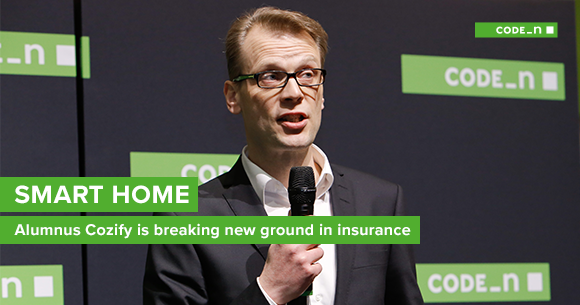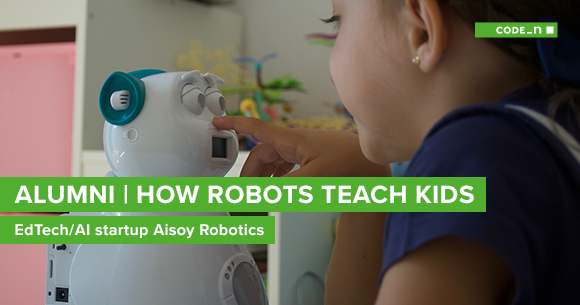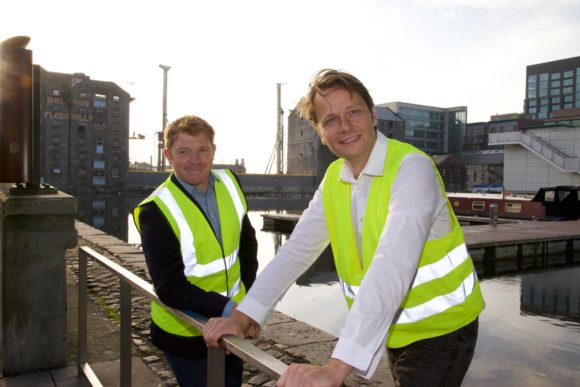CODE_n CONFERENCE: Interview with moderator Armin Eichhorn
 Armin Eichhorn is an entrepreneur with a passion. After spending a number of years with international companies, the management strategy expert now focuses entirely on founding and supporting start-ups. On Thursday and Friday, he will be acting as moderator, guiding visitors through the CODE_n conference at CeBIT. We spoke to Armin Eichhorn about his affinity with start-ups.
Armin Eichhorn is an entrepreneur with a passion. After spending a number of years with international companies, the management strategy expert now focuses entirely on founding and supporting start-ups. On Thursday and Friday, he will be acting as moderator, guiding visitors through the CODE_n conference at CeBIT. We spoke to Armin Eichhorn about his affinity with start-ups.
You’ve invested a lot of time and money into start-ups in recent years. And this experience prompted you at one point to come up with four principles. One of these is “Experience, not things”. But at CODE_n, it’s about the very opposite: things. How does this fit with your role as moderator at the CODE_n conference program?
Armin Eichhorn: I’ve developed my four principles over time. They act as guidelines that guide me when I’m facing a decision where I’m not intuitively sure about what to do. My principle of “Experience, not things” is based on the fact that I want lots of experience rather than many things around me. And I believe that this can be transferred quite nicely to the “Internet of Things”.
I often see start-ups obsessing about the functions and the object. This borders on the ‘geeky’. It’s all very well in principle, but there’s a danger there too: namely, that they find the device so great that they don’t think about how the user can actually use it. In other words, why someone should buy, lease or hire it. With the Internet of Things, you have to consider the following points: What can I achieve in terms of technology? What are the new possibilities? What can we establish as a team? If you’ve developed something, then it’s essential to find a real situation in which it can be used. Success is only found on the mass market if you offer people an experience that they’re willing to pay for.
One great example of this, I think, is Nest. Nest is a company that produces smoke alarms and thermostats. Smoke alarms and thermostats are actually pretty boring products. But Nest has integrated a few functions that are out of the ordinary: with the thermostat, you don’t set what temperature you want it to be at a certain time, but rather you control the temperature manually to begin with. The device then learns the times at which you control the temperature and then decides when it should heat or cool the home by itself. And this is then the point that people are paying for, since it means that it’s warm when they come home and they can save energy when they’re not at home. People therefore aren’t paying for the device itself, but rather for the function that the device is offering them. It’s a product in the Internet of Things that is attractive to people as an experience rather than as a product per se. I think very few people buy a thermostat like that for the sake of having a thermostat. Rather, they buy it because of the experience they have with it or the added value they can achieve with it.
What’s the reason behind your passion for founding, for self-founding, for active but also for passive involvement, for making your contribution, without making a direct profit yourself. You certainly like taking on an advisory role for start-ups.
Armin Eichhorn: That’s right. I very much love helping other people, which is why I don’t just do my own thing. At the same time, I take care not to end up in the role of adviser. My focus lies on making ideas reality. It’s what excites me. Having an idea or coming up with an idea that someone else had but doing something a little bit unusual with it. An entrepreneur is someone who increases opportunities and reduces risks. It’s something we do all day long.
The simplest risks, which are the most easily recognizable, are the technical challenges. An electric car, for example, with a small range: that’s a problem. But it’s not a problem that should put people off. You can try to develop a technology that will increase the range or you can turn to a target group that doesn’t need a large range. And if you do this the entire time, i.e. look at the risks and opportunities constantly, then you can have a whole lot of fun with it.
I’ve been actively involved with multiple start-ups, in some cases as the founder, and in some cases I got on board very early. Every day, you tackle something different, you find your way from one situation to the next. Before my days in start-ups, I spent three and a half years working for a very large, very successful company. I had a secure job, it was an exciting place to work, because we grew rapidly and we had to do new things all the new time. But the new things were limited to the further development of what we already had. It was no longer enough for me. So I got into the start-up scene.
Where do you actually come from, if you don’t mind me asking?
Armin Eichhorn: I’ve been around a bit. I was born in Frankfurt, lived most of my life in NRW and then spent five years abroad in various countries. I was studying then and working for the company that I spent time in three different countries with. Now I’m in Berlin, the start-up capital of Europe.
Let’s look at CODE_n as an innovation network. What are the challenges that young companies on the one hand but also established companies on the other are facing currently, and how can these two roles complement each other? Specifically, what can the big players expect from start-ups and their mindsets?
Armin Eichhorn: Young companies are usually founded by young people who approach certain things with a degree of optimistic naivety. There’s going to be more and more of it. This development offers the greatest opportunity to established companies. In an established company, there is not necessarily a need to do something completely new and therefore possibly tap into a further market. From my experience, this has a great deal to do with the fact that there are so many things in everyday business that you’re already responsible for that you simply don’t have the creative capacity to sit down for two or three hours at a time with a few people, completely unhindered, to come up with new ideas from scratch.
It would be ideal for companies if employees could actually do that. I know of some companies in Berlin and in other places that are now approaching start-ups and asking them how this concept can implemented in the company. But it’s difficult. Developing new ideas means neglecting the everyday business.
So where does the huge opportunity lie? The huge opportunity for major companies lies in looking around at start-ups, such as at CODE_n. The question then is to determine what potential these start-ups have. You need to think about where they might be in five years’ time – and whether you want to be with them.
What a company can actually really do in specific terms is a type of cooperation. You shouldn’t completely swallow up a young start-up, since then the people doing the everyday business go under. It’s much better to give the start-up a garage or a stylish office with dense Internet connectivity and let them get on with it. And in the ideal scenario, the finished product can then be included in the company’s portfolio five years later. A young start-up will be very grateful if someone signs a 3 or 5-year contract with them. That’s because it offers the stability that start-ups don’t have. They may not want to sell out completely, but no start-ups have any problem with conceding a little ground in exchange for assistance. For the company, this can develop into something in the medium term, for example an expansion of the product portfolio.
I saw an interview with Hasso Plattner once, in which he drew a very pertinent comparison. He said that SAP is like a huge ocean tanker that takes cargo from Hamburg to New York and around this tanker are a whole host of tiny ships that themselves are also relatively agile. The big tanker itself isn’t very agile at all, because it can barely move, and it actually also needs this constancy. That’s what you’re ultimately saying, isn’t it? Major companies don’t have the ability to deliver flexibility, and if these small support vessels were to physically attach themselves to the ocean tanker, then they too wouldn’t be able to be as agile and turn around as quickly as they’d like to. In turn, they wouldn’t be able to achieve the goals they want.
Armin Eichhorn: Exactly. The big ship continues to do its thing. On their own, these little ships would never get from Hamburg to New York, which is why the big ship constantly provides them with a little more fuel, a little sustenance. That’s the best way to make progress.





Write a comment